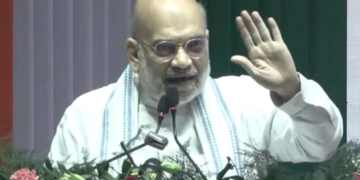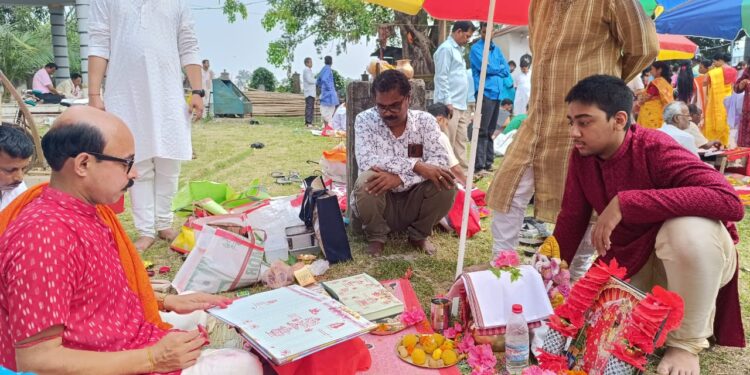Agartala, April 14:Hundreds of Hindu Bengalis gathered at temples across the regions to offer prayers and celebrate Poila Boishakh, marking the first day of the Bangla calendar, amidst an atmosphere of joy and spirituality.
This year, the calendar reads 1431 according to the Bengali Sakabdi, with the first day symbolizing the auspicious beginning of creation by the Hindu Creator God Lord Brahma.
Ahead of Poila Boishakh, households underwent thorough cleaning and embellishment to welcome the Goddess Lakshmi and God Ganesha, heralding prosperity and auspiciousness for the coming year.
Adorned in new attire, devotees flocked to temples to seek blessings, a tradition deeply ingrained in Indian households where the young seek the guidance and blessings of their elders.
In a gesture of goodwill and longevity, women applied vermilion on each other’s foreheads and drew auspicious symbols on temple walls, symbolizing hopes for familial harmony and well-being.
Prayers and offerings were made to the deities, beseeching for blessings and prosperity in the year ahead.
Shopkeepers commenced their day by worshipping Laxmi-Narayan and Ganesha, invoking blessings for a successful and prosperous business year.
A significant ritual observed by Hindu priests included drawing the Swastik symbol with vermilion in traders’ ‘Hal Khata’ (accounts book), a custom believed to bring good fortune and prosperity in business ventures.
Beyond spiritual observances, Bengali communities in Tripura indulged in festivities by exchanging new clothes and gifts, preparing special delicacies, and congregating with loved ones to relish the joys of togetherness.
Poila Boishakh, also known as Nôbobôrsho, transcends religious and regional boundaries, uniting all ethnic Bengalis in celebration.
The day is synonymous with warmth, camaraderie, and the spirit of new beginnings.
As greetings of “Shubho Nobo Borsho” resound, Poila Boishakh signifies not just the start of a new year, but a time of shared joy and cultural vibrancy for Bengalis worldwide.
Interestingly, Poila Boishakh coincides with other regional festivities, including the Sikh harvest festival Vaisakhi, Assamese Bihu, and the Malayalee New Year and harvest festival Vishu, highlighting the rich tapestry of cultural diversity and celebration that marks this auspicious day.








































